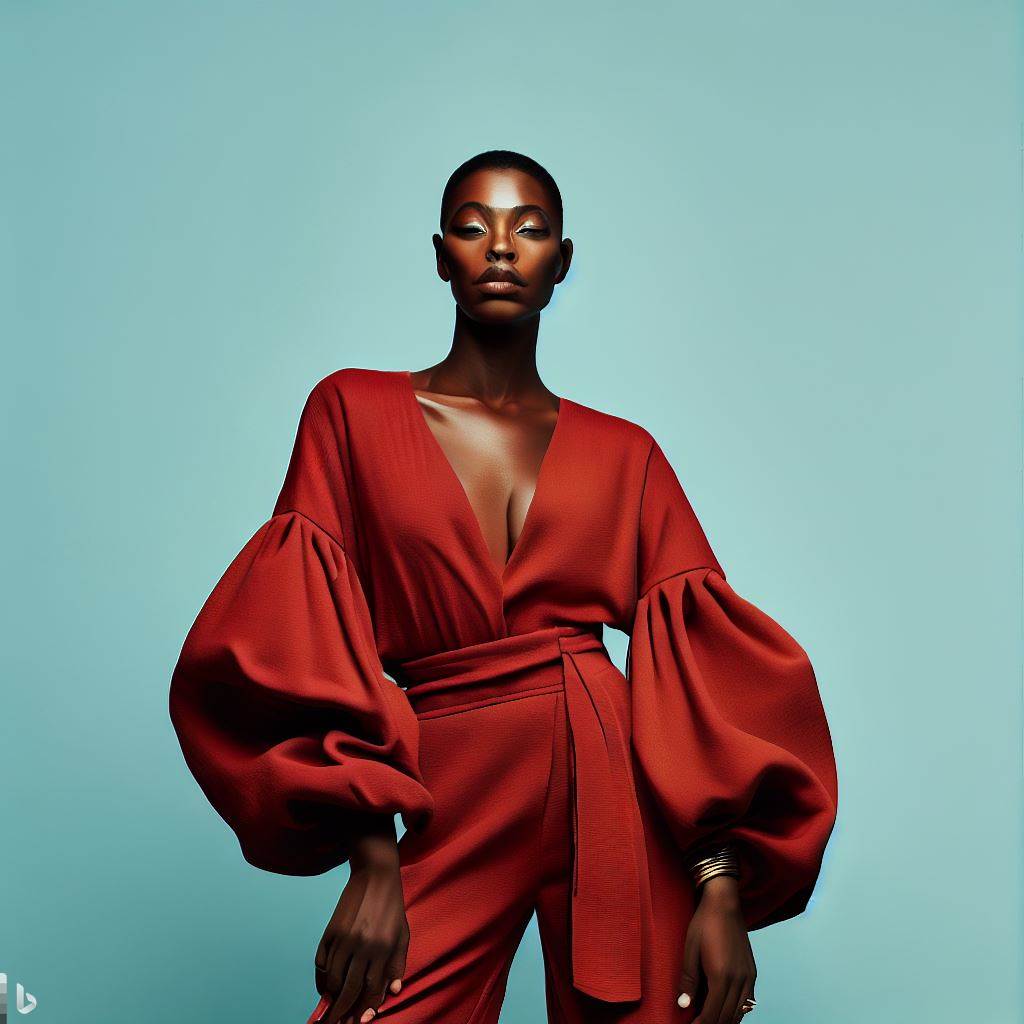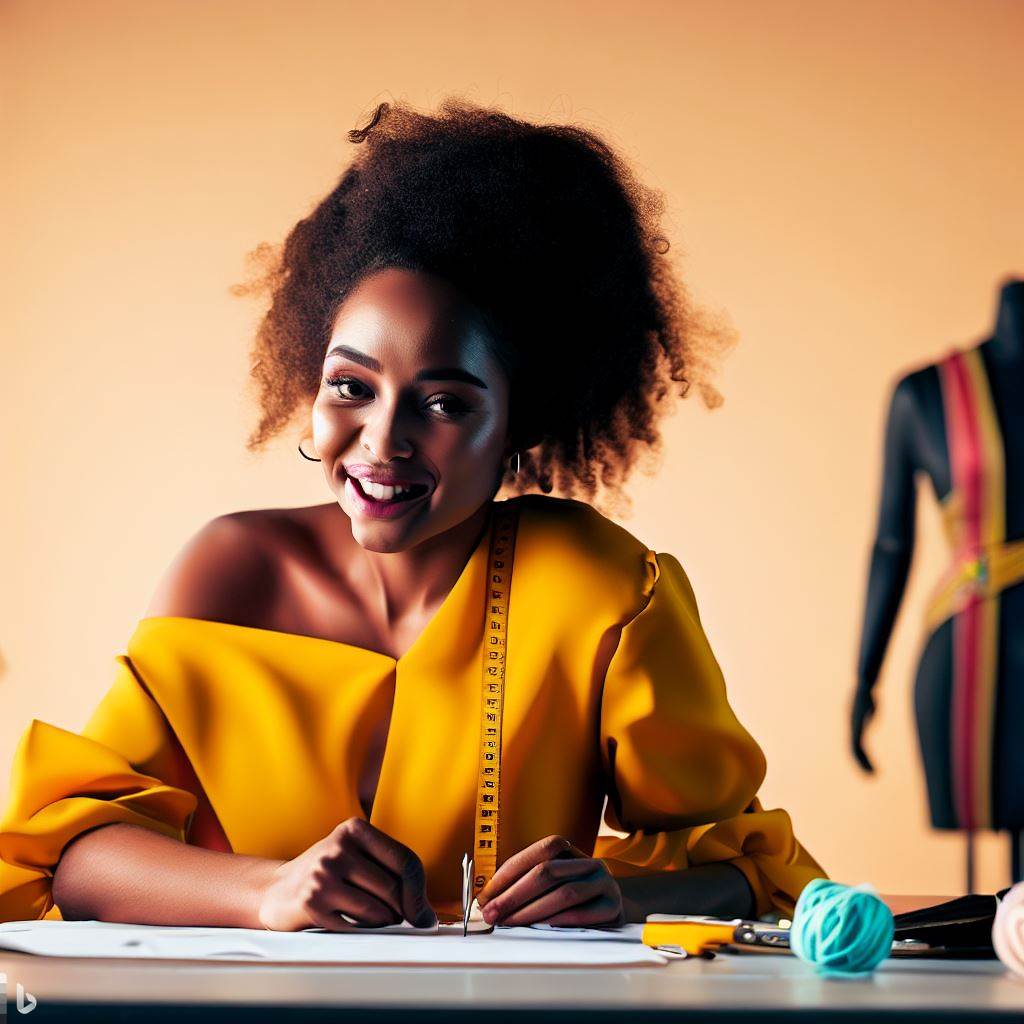Introduction
Becoming a fashion designer in Nigeria offers immense opportunities for success and career growth.
The fashion industry in Nigeria has gained immense popularity in recent years, attracting both local and international attention.
With its vibrant culture, distinct fashion sense, and growing economy, Nigeria has become a hub for aspiring fashion designers.
The country’s rich textile heritage and diverse fashion aesthetics offer endless creative possibilities for those looking to make a mark in the industry.
As a fashion designer in Nigeria, you have the potential to create your own unique designs and establish a successful career.
The demand for Nigerian fashion is not limited to the local market; it has garnered international recognition, with Nigerian designers participating in prestigious fashion shows and collaborations worldwide.
Moreover, the rise of social media platforms has provided designers with a global platform to showcase their work and attract a wider audience.
From creating bespoke traditional outfits to designing contemporary clothing and accessories, the possibilities for a budding fashion designer in Nigeria are limitless.
By staying updated with the latest trends, honing your skills, and building a strong network within the industry, you can pave your way towards a successful career in fashion design in Nigeria.
Understanding the Fashion Industry in Nigeria
The fashion industry in Nigeria has experienced significant growth in recent years.
This growth can be attributed to several factors, including the increased availability of fashion education and resources, as well as the rise of social media and online shopping platforms.
The influence of Nigerian couture on the global fashion stage
Nigeria’s fashion industry is not only growing domestically but also gaining recognition on the global fashion stage.
Nigerian designers, such as Lisa Folawiyo and Deola Sagoe, have showcased their collections at international fashion events like London Fashion Week and New York Fashion Week.
Nigerian couture has made a significant impact on the global fashion scene.
The unique blend of traditional African fabrics and modern designs has caught the attention of fashion enthusiasts worldwide.
Nigerian designers are known for their vibrant colors, intricate patterns, and attention to detail, which set them apart from their counterparts in other countries.
The different fashion segments and niches in the Nigerian market
In the Nigerian market, there are various fashion segments and niches that cater to different consumer preferences.
The traditional attire segment focuses on the production of ethnic clothing, such as Ankara and Asoebi, which are worn for cultural events and special occasions.
The ready-to-wear segment provides affordable and trendy clothing for everyday wear. This segment has become increasingly popular due to its accessibility and affordability.
Many Nigerian fashion brands, both established and emerging, are tapping into this segment to meet the demands of the mass market.
The luxury fashion segment caters to the high-end market, offering exclusive and premium designs.
These designer brands target affluent consumers who are willing to spend more on quality and exclusivity.
Luxury fashion in Nigeria is synonymous with opulence and sophistication.
The streetwear and casualwear segments are also gaining traction in Nigeria.
With the influence of global street style and urban culture, Nigerian youth are embracing the athleisure trend and incorporating it into their everyday wardrobes.
Homegrown streetwear brands are emerging to cater to this growing demand for fashion-forward casual clothing.
Other niches in the Nigerian market
The Nigerian fashion industry also encompasses other niches such as accessories, footwear, and jewelry.
These sectors provide opportunities for designers and entrepreneurs to showcase their creativity and craftsmanship.
From handcrafted statement necklaces to locally made leather shoes, these accessories add the finishing touches to an outfit and contribute to the overall fashion experience.
Overall, the fashion industry in Nigeria is thriving and evolving at a rapid pace. It has become a significant contributor to the country’s economy and cultural identity.
With the support of government initiatives, fashion education institutions, and the growing global recognition of Nigerian designers, the industry is set to continue its upward trajectory.
Whether aspiring to become a fashion designer or simply a fashion enthusiast, Nigeria offers a vibrant and exciting fashion landscape to explore and be a part of.
Read: Unions for Writers in Nigeria: Role and Influence
Developing a Passion for Fashion Design
Fashion design is not just a career choice; it is a calling that speaks to the creative souls within us.
Many aspiring fashion designers in Nigeria have unique stories and personal experiences that ignited their pursuit of this glamorous yet challenging profession.
In this section, we will explore the importance of having a genuine passion for fashion design, share inspirational stories, and provide tips for discovering and nurturing your own creative interests.
1. Diving into Personal Stories
- Ngozi, a budding fashion designer, recalls her childhood fascination with her grandmother’s sewing machine.
- Ahmed, a self-taught designer, shares his journey of discovering fashion as an outlet for his artistic expression.
- Tolu, inspired by the vibrant Nigerian fashion scene, describes how attending fashion shows fueled her passion.
2. Understanding the Significance of Passion
Passion is the driving force behind every successful fashion designer. It fuels dedication, perseverance, and continuous growth.
Without genuine enthusiasm, the challenges and demands of the industry can become overwhelming.
3. Tips for Discovering and Nurturing Creative Interests
- Explore Various Fashion Styles: Attend fashion shows, browse magazines, and follow fashion blogs to expose yourself to diverse designs and trends.
- Experiment with Different Forms of Art: Try painting, sketching, or even photography to discover your unique artistic voice.
- Enroll in Fashion Designing Courses: Taking classes or workshops can provide formal training and improve your skills.
- Network with Fashion Designers: Attend industry events and connect with established designers who can offer guidance and mentorship.
- Build a Strong Portfolio: Document your work and create a digital or physical portfolio to showcase your creativity and development.
4. Overcoming Challenges and Staying Motivated
- Embrace Failure as a Learning Opportunity: Mistakes will happen, but they serve as stepping stones towards improvement and growth.
- Stay Updated with Industry Trends: Fashion is ever-evolving, so it is crucial to stay informed about emerging styles, materials, and techniques.
- Surround Yourself with Supportive Communities: Join fashion-related groups or online forums where you can share experiences, seek advice, and find encouragement.
- Stay Focused on Your Personal Style: Develop your aesthetic and unique design signature to stand out in a competitive industry.
- Believe in Yourself: Fashion design requires confidence and self-belief. Trust your instincts and never doubt your capabilities.
In short, becoming a successful fashion designer in Nigeria requires more than just skills and knowledge.
It demands an unwavering passion, nurtured through personal experiences, exploration, and continuous learning.
By developing your creative interests and embracing the challenges along the way, you can truly embark on a fulfilling journey in the world of fashion design.
Read: Understanding Copyright Laws for Writers in Nigeria
Educational Opportunities and Training
The field of fashion design requires a certain level of knowledge and skills, which can be acquired through formal education or training.
Here are some factors highlighting the relevance of obtaining a fashion design education:
- Establishing a Strong Foundation: Formal education provides a solid foundation in the principles and techniques of fashion design.
- Building Technical Skills: Fashion design courses offer hands-on training in various aspects like patternmaking, sewing, draping, and garment construction.
- Understanding Fashion Theory: Studying fashion design allows aspiring designers to grasp the concepts of fashion history, trends, and aesthetics.
- Developing Creativity: Through education, designers can explore their creativity, learn to experiment, and hone their personal style.
- Networking Opportunities: Fashion schools provide a platform to meet like-minded individuals, industry professionals, and potential collaborators.
- Familiarization with Industry Standards: Formal education exposes students to industry practices and helps them understand the business side of fashion.
In Nigeria, there are several institutions and programs that offer fashion design courses:
- Yaba College of Technology: is one of the oldest and most reputable institutions offering fashion design programs in Nigeria.
- Fashion Designing Institutes: Institutes such as the Fashion Designers Association of Nigeria (FADAN) offer short-term courses.
- Private Fashion Design Schools: These schools specialize in fashion education, providing intensive training in design and garment production.
- Universities: Some universities offer fashion-related programs within their fine arts or design departments.
- Online Courses: Various online platforms offer fashion design courses, allowing flexibility for self-paced learning.
The benefits of enrolling in a fashion design school or program are manifold.
- Structured Learning Environment: Design schools provide a focused and disciplined atmosphere conducive to learning.
- Guidance from Industry Experts: Students receive guidance and mentorship from experienced faculty members who have worked in the fashion industry.
- Access to Resources: Fashion schools offer well-equipped studios, libraries, and equipment necessary for hands-on training.
- Industry Exposure: Many fashion schools organize workshops, fashion shows, and internships that provide valuable exposure to the industry.
- Opportunities for Collaboration: Working closely with fellow students allows for collaborative projects, fostering creativity and teamwork.
- Recognition and Credibility: Graduating from a reputable fashion design program enhances one’s credibility and opens doors to better career prospects.
Ultimately, formal education or training plays a vital role in becoming a successful fashion designer in Nigeria.
It provides aspiring designers with the necessary skills, knowledge, industry exposure, and networking opportunities essential for a fruitful career in fashion.
Read: Profiles of Successful Social Workers in Nigeria
Building a Portfolio
Creating a fashion design portfolio is essential for aspiring fashion designers in Nigeria.
A portfolio serves as a visual representation of a designer’s skills, creativity, and unique style.
It is a powerful tool that helps designers showcase their talent, attract clients, and secure opportunities in the industry.
Significance of a Fashion Design Portfolio
A fashion design portfolio holds immense significance in the industry.
It is like a designer’s resume, which can communicate their proficiency and potential to potential clients, employers, or fashion houses.
A portfolio helps designers stand out among their peers and leave a lasting impression on industry professionals.
- Demonstrates Skills: A portfolio displays a designer’s technical skills, including pattern making, garment construction, and textile selection.
It shows the designer’s ability to transform ideas into tangible fashion pieces. - Highlights Creativity: Fashion is all about creativity, and a portfolio provides a platform for designers to showcase their unique style, innovative designs, and artistic vision.
- Shows Adaptability: A well-curated portfolio demonstrates a designer’s versatility and adaptability to different styles, themes, or fashion genres.
It reassures potential clients that the designer can cater to their specific needs and preferences. - Builds Credibility: A strong portfolio establishes a designer’s credibility in the industry. It acts as evidence of their past accomplishments, collaborations, and successful projects.
Creating a Standout Portfolio
Building a standout fashion design portfolio requires careful consideration and attention to detail.
Here are some essential tips to create an impressive portfolio:
- Showcase Your Best Work: Include only your strongest and most creative designs in your portfolio. Quality over quantity is crucial to making a lasting impression.
- Organize Strategically: Arrange your portfolio in a logical and visually appealing manner. Consider categorizing designs by theme, collection, or season.
- Use High-Quality Images: Invest in professional photography or high-resolution images that effectively capture the details and essence of your designs.
- Include Technical Drawings: Alongside the final garments, include sketches or technical drawings that demonstrate your design process and attention to detail.
- Display Range: Feature a diverse range of designs to showcase your versatility. Include different styles, silhouettes, colors, and fabric choices.
- Consider Presentation Format: Choose a format that suits your designs. It can be a physical portfolio, an online portfolio website, or a combination of both.
- Keep it Updated: Regularly update your portfolio with new designs, collaborations, or industry experiences to reflect your growth and development as a designer.
The importance of Showcasing Unique Style and Creativity
In today’s competitive fashion industry, showcasing a unique style and creativity is crucial for success.
Clients, fashion houses, and industry professionals are always seeking fresh and innovative ideas.
- Stand Out: A unique style helps designers stand out from the crowd and grab attention in a saturated market.
- Establish a Brand Identity: Showcasing your creativity in the portfolio allows you to establish a recognizable and distinct brand identity.
- Inspire Confidence: Demonstrating your unique style and creativity reassures clients and employers about your ability to deliver exceptional and novel designs.
- Attract Target Audience: By showcasing your creativity, you can attract clients who appreciate and resonate with your particular aesthetic, leading to long-lasting relationships.
In fact, a fashion design portfolio is an indispensable tool for aspiring fashion designers in Nigeria.
It helps designers demonstrate their skills, creativity, and unique style.
By following these guidelines, designers can create a standout portfolio that will open doors to opportunities and success in the industry.

Networking and Industry Connections
Networking plays a crucial role in the fashion industry, as it helps aspiring fashion designers in Nigeria to build valuable connections and establish their presence in the competitive market.
Here are some tips on how to effectively build connections with other designers, models, and industry professionals.
- Attend fashion shows, exhibitions, and industry events: These events provide a platform to meet like-minded individuals and industry experts, offering opportunities for collaboration and exposure.
- Join fashion associations and organizations: Being a part of these groups allows you to connect with seasoned professionals and gain insights about the industry.
- Utilize social media platforms: Engage with fashion influencers, designers, and models by following them on platforms such as Instagram and LinkedIn. Leave meaningful comments and participate in relevant discussions.
- Volunteer or intern at fashion houses: This hands-on experience provides an excellent chance to learn from established designers and build connections with industry veterans.
- Collaborate with other designers: Partnering with fellow designers on projects or events can help expand your network and create opportunities for mutual growth.
- Attend workshops and seminars: These educational platforms not only enhance your skillset but also allow you to connect with professionals who share a similar passion for fashion.
- Engage with fashion bloggers and influencers: Promoting your work through collaborations with popular bloggers and influencers can help you reach a wider audience and gain credibility.
- Build genuine relationships: Networking is not just about collecting business cards; it’s about creating meaningful connections. Take the time to get to know people and show genuine interest in their work.
- Stay updated on industry news and trends: Knowledge about the latest developments in the fashion industry allows you to engage more effectively with industry professionals during networking events.
Attending fashion shows, exhibitions, and industry events offers several benefits for aspiring fashion designers in Nigeria
- Exposure to new trends and designs: Attending these events provides firsthand exposure to the latest designs and trends, which can inspire and influence your own work.
- Opportunity to showcase your work: Fashion shows and exhibitions offer a platform to showcase your designs and gain recognition within the industry.
- Networking opportunities: These events bring together a variety of industry professionals, providing the chance to network and build connections with potential collaborators and mentors.
- Access to industry resources: Fashion shows often feature industry suppliers, manufacturers, and vendors, providing opportunities to source materials and establish business relationships.
- Reputation building: By actively participating in fashion shows and exhibitions, you can establish your reputation as a serious and talented fashion designer.
- Feedback and critique: Fashion shows allow you to receive feedback and critiques from industry professionals, which can help improve your designs and skills.
- Industry insights and knowledge sharing: Attending industry events offers valuable insights into the fashion industry’s workings and allows you to learn from experienced professionals.
In the end, networking and building industry connections are essential steps for anyone aspiring to become a successful fashion designer in Nigeria.
By actively engaging with industry professionals, attending events, and collaborating with fellow designers, you can establish your presence in the industry and pave the way for a successful career.
Read: Influential TV Producers: Shaping Nigeria’s Television Scene
Starting a Fashion Design Business
If you have a passion for fashion and want to become a fashion designer in Nigeria,
Here are the essential steps to starting your own fashion design business.
- Develop your fashion design skills: Hone your skills through formal education or apprenticeship programs. Take courses in fashion design, pattern making, and sewing to gain technical expertise.
- Identify your target market: Determine the segment of the population you want to cater to, such as women’s wear, men’s wear, children’s wear, or ethnic wear. Understand their preferences and build your brand accordingly.
- Create a solid business plan: This serves as a roadmap for your fashion design business. It outlines your objectives, target market, competition analysis, financial projections, and strategies for growth.
- Secure funding: Determine the startup costs for your fashion design business, including equipment, raw materials, studio space, marketing expenses, and working capital. Explore options like personal savings, bank loans, or seeking investors.
- Register your business: Consult the Corporate Affairs Commission (CAC) to register your fashion design business as a legal entity.
Choose a business name that reflects your brand identity and ensure it is not already in use.
Legal requirements, permits, and licenses
- Obtain necessary permits and licenses: Research the licensing requirements for operating a fashion design business in Nigeria.
This may include obtaining a trade license, tax identification number, and compliance with health and safety regulations. - Set up your studio: Find a suitable location for your fashion design studio. Consider factors like accessibility, affordability, and proximity to your target market.
Create a functional and inspiring space for designing, pattern making, and sewing. - Source quality materials and equipment: Establish relationships with reliable fabric suppliers and other vendors.
Invest in high-quality sewing machines, cutting tables, and other necessary equipment to ensure the production of top-notch designs. - Build a network of suppliers and contractors: Collaborate with skilled artisans like embroiderers, tailors, and beaders who can help bring your designs to life.
Create a mutually beneficial relationship with suppliers to ensure timely delivery of materials.
The importance of a solid business plan and marketing strategy
- Develop a marketing strategy: Identify the most effective marketing channels to reach your target audience.
Utilize social media platforms, fashion exhibitions, and fashion shows to showcase your designs and build brand awareness. - Create a portfolio: Develop a portfolio showcasing your best designs. This will act as a visual representation of your skills and creativity.
Include high-quality photographs of your pieces along with detailed descriptions. - Establish an online presence: Create a professional website and engage in social media marketing to showcase your fashion design business.
Utilize platforms like Instagram, Facebook, and Twitter to connect with potential customers and influencers. - Provide excellent customer service: Focus on providing exceptional customer service to build a loyal customer base.
Ensure that your designs are of high quality and deliver orders promptly while maintaining clear communication with clients. - Keep up with industry trends: Stay updated with the latest fashion trends, both locally and globally, to offer designs that resonate with your target market.
Attend fashion events, read fashion magazines, and follow influential fashion bloggers to stay informed. - Continuously improve your skills: Keep learning and expanding your fashion design skills. Attend workshops, seminars, and courses to enhance your technical knowledge and stay ahead in the ever-evolving fashion industry.
By following these essential steps, you can successfully start and grow your fashion design business in Nigeria.
Remember, patience, perseverance, and passion are key ingredients for success in the highly competitive world of fashion.
Good luck on your fashion design journey!
You Might Also Like: Sourcing Materials: Interior Decorators’ Guide in Nigeria
Challenges and Solutions for Fashion Designers in Nigeria
Identify common challenges faced by fashion designers in Nigeria
- Limited access to capital and funding for setting up a fashion design business.
- Inadequate infrastructure and a lack of modern equipment and machinery.
- Fierce competition from established fashion brands both locally and internationally.
- Difficulty in sourcing quality and affordable fabrics and materials.
- Inadequate support and recognition from the government and relevant institutions.
- Lack of professional training and education in fashion design.
- Challenges in marketing and promoting their brand in a crowded industry.
- Inefficient supply chain and logistical challenges.
- Intellectual property theft and plagiarism of designs.
Offer practical solutions and advice to overcome these challenges
- Managing clients’ expectations and meeting their specific needs.
- Explore alternative sources of funding such as grants, loans, and partnerships.
- Invest in modern equipment and machinery to improve productivity and efficiency.
- Differentiate your brand by emphasizing unique designs, craftsmanship, and cultural heritage.
- Network with local fabric producers and manufacturers to ensure a steady supply of materials.
- Advocate for policies and incentives that support and empower fashion designers in the country.
- Seek professional training and education through workshops, courses, and mentorship programs.
- Utilize digital marketing platforms and social media to showcase your brand and reach a wider audience.
- Establish strong relationships with reliable suppliers and seek innovative ways to streamline the supply chain.
- Protect your designs by registering copyrights and trademarks.
- Build a reputation for excellent customer service and deliver high-quality custom designs.
Share success stories of Nigerian fashion designers who have overcome obstacles
Jewel by Lisa, a renowned Nigerian fashion brand, started with limited resources but gained international recognition by showcasing Nigerian prints and styles on global runways.
Tokyo James, a Nigerian-British designer, faced challenges in establishing himself in Nigeria but successfully launched his own label, gaining prominence in the international fashion scene.
Lisa Folawiyo, founder of the brand Lisa Folawiyo Studio, transformed traditional Nigerian prints into modern and innovative designs, earning her a spot on the global fashion map.
These success stories highlight the resilience and creativity of Nigerian fashion designers and serve as inspiration for aspiring designers facing similar challenges.
Lastly, becoming a fashion designer in Nigeria comes with a unique set of challenges.
However, with determination, creativity, and strategic solutions, these challenges can be overcome, paving the way for a successful and thriving fashion design business in Nigeria.
Conclusion
Becoming a fashion designer in Nigeria can be a fulfilling and rewarding journey.
Throughout this blog post, we have discussed key points that aspiring fashion designers need to consider.
We have highlighted the importance of developing a unique sense of style, staying updated with current trends, and understanding the Nigerian fashion industry.
It is also crucial to acquire the necessary skills and knowledge through formal education or apprenticeships.
Furthermore, we have emphasized the significance of networking and building relationships with industry professionals.
Attending fashion shows, exhibitions, and workshops can provide valuable exposure and opportunities for collaboration.
Aspiring fashion designers in Nigeria should not be discouraged by challenges and setbacks.
Instead, they should use these experiences as stepping stones towards success. Hard work, dedication, and patience are all essential qualities for achieving one’s dreams in the fashion industry.
It is our hope that this blog has inspired and motivated aspiring fashion designers to pursue their dreams in Nigeria.
With a vibrant and diverse fashion scene, the country offers immense potential for creativity and innovation.
Publish Your Professional Profile, Business or Brand
Showcase your expertise, gain trust, and boost visibility instantly on Professions.ng.
Publish NowWe encourage our readers to take action and start their journey towards becoming a fashion designer in Nigeria.
Whether it is sketching designs, learning to sew, or attending fashion events, every step counts towards making their dreams a reality.
Remember, the world of fashion is ever-evolving, and Nigeria is a melting pot of talent and opportunities.
So go ahead and embark on your fashion design journey in Nigeria; your passion and dedication will be the keys to your success!




